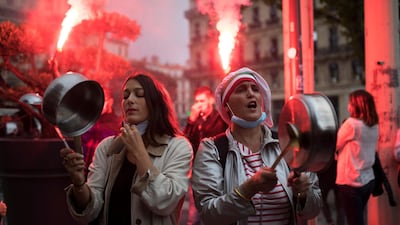Paris will reintroduce strict restrictions shutting all bars and cafes from tomorrow to stop the city’s hospital beds from being overwhelmed by coronavirus cases.
The city’s police chief Didier Lallement said today the “epidemic is moving too fast” and declared the city would be put on maximum coronavirus alert.
France reported nearly 17,000 new coronavirus cases on Saturday alone - the highest figure since widespread testing began.
In Paris, there are about 3,500 new cases per day, with nearly 6,000 reported last week.
Mr Lallement said all bars and cafes would be shuttered for two weeks as health authorities try to get a handle on the infection rate.
He said: “These are braking measures because the epidemic is moving too fast.
"From tomorrow, all bars will be closed."
Bars in Paris have continued to draw large crowds of people often flouting physical distancing and mask-wearing guidelines, and are a major concern along with congested public transport as contamination hotspots.
Restaurants can continue to operate provided they meet newly-tightened conditions.
These include making sanitising hand gel available at all dining tables, limiting patrons to six a table with at least a metre between seats, and allowing customers to remove their masks only for eating.
Paris health chief Aurelien Rousseau said there were about 203 active coronavirus "clusters" in the wider Paris region.
The city had previously passed three worrying thresholds requiring its reclassification as a region on maximum alert.
These were the general rate of virus prevalence, its spread among older people at higher risk of serious illness, and the number of intensive care beds taken up by coronavirus patients - now at 36 percent.
Mr Rousseau said: "The pressure is strong and we know what will happen in the 15 coming days.
"We know that we will arrive at about 50 per cent of intensive care beds occupied by Covid patients. The point is to brake this progression."
Pools and gyms in Paris will also remain off-limits except for school activities, while public gatherings will be limited to 10 people and there will be a ceiling of 1,000 people in open-air stadiums for sporting or cultural events.
Visits to people in elderly care homes may continue but only by appointment and limited to two visitors at a time.
Alcohol sales after 10pm will remain prohibited, as will weddings and other parties in reception halls, and all expos or conferences held under large tents.
Clients will be limited to one per four square metres in shopping malls.
The measures will be reviewed at the end of the 15-day period on October 19.
French interior minister Gerald Darmanin acknowledged on Sunday that Parisians would find the restrictions tough.
"We are French, we love to drink, to eat, to live, to smile and to kiss each other," he said.
Meanwhile, angry restaurant and bar owners protested in Marseille to challenge a French government order that shut their doors.
The protesters and local officials in France’s second-biggest city are also threatening legal action to try to block the order in the courts.
They argue that Marseille’s virus case rise has been stabilising, and that the government in Paris had unfairly singled out Marseille for the toughest coronavirus measures in France.
French health minister Olivier Veran defended the government’s decisions on a visit to the city.
He said: “I am fully aware that some of the measures being debated … raise concerns, questions, even anger.
“These measures are necessary. They are temporary, but they are not arbitrary.”
Paris and Marseille are among a slew of European cities returning to a form of lockdown.
In Spain, people can only travel to Madrid for essential journeys as the city battles an infection rate of 850 cases per 100,000 people.
More than 16 million people in the UK are currently under local lockdown measures, with tough restrictions affecting much of England’s north and the Midlands, including Birmingham, Manchester and Liverpool.











